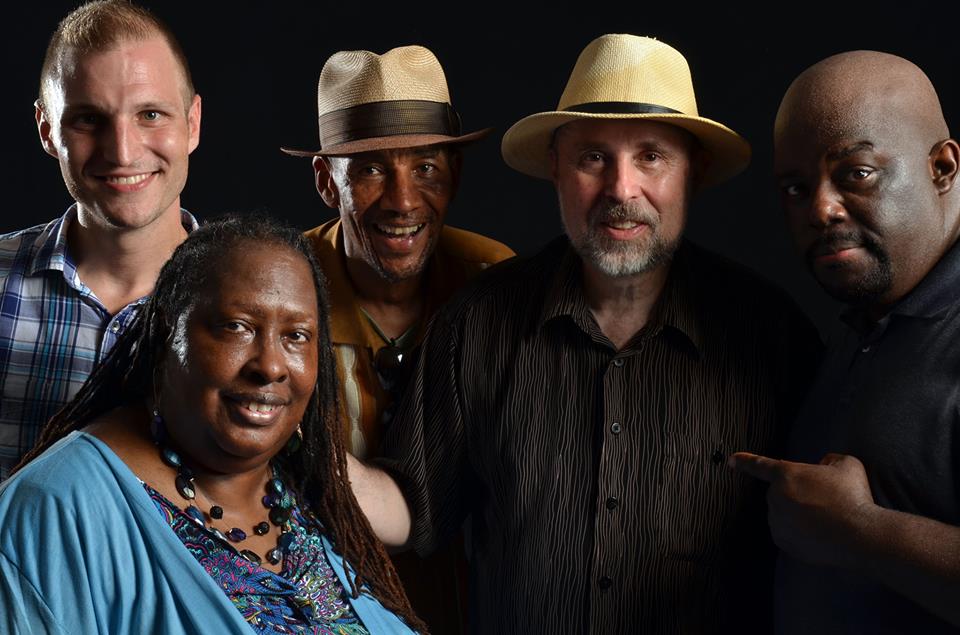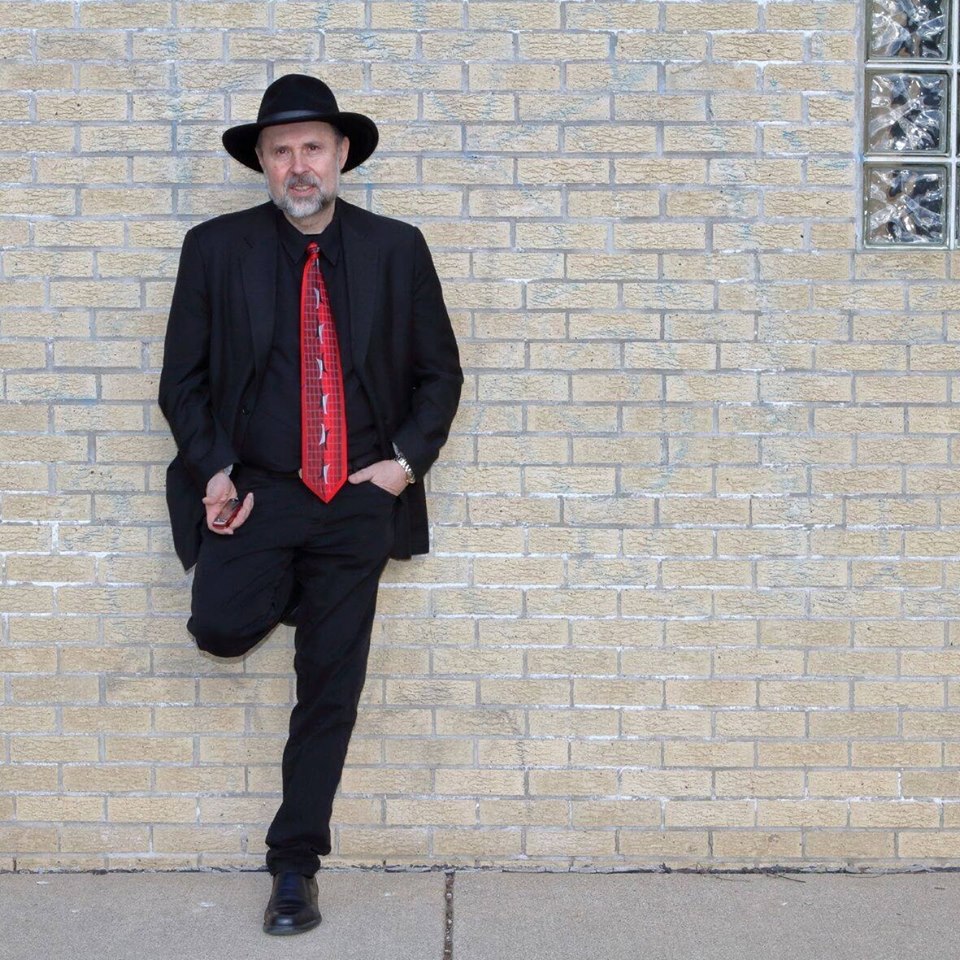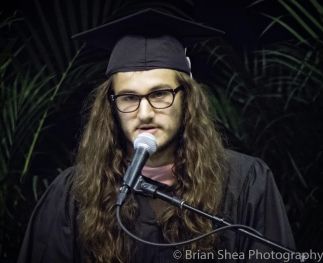2016 has certainly been a memorable year for one of the most respected American Blues bands, Mississippi Heat. Their 2016's stunning album Cab Driving Heat has received unanimous praises from the worldwide music press and the Chicago-based collective, through their fabulous combo of Blues, Funk, Boogie and Rumba has once again shown the quality and the charisma of one of the most eclectic and innovative bands of the Blues scene.
The last 12 months have seen the band being very busy promoting and touring incessantly Cab Driving Heat but Bluebird Reviews has being waiting patiently and finally managed to talk to Mississippi Heat's bandleader Pierre Lacocque about the band's new album and the impact that music has always had in Lacocque's personal life and career as a musician.
BBR - Pierre, thank you so much for talking to us. Cab Driving Heat is a record that embraces many different layers of traditional blues coming from places like Chicago or New Orleans but still adding the unmistakable trademark sound of the Mississippi Heat. How long did it take to write and record this wonderful album?
PL - Overall, I would say over a year, considering all the aspects in putting together the music, the arrangements and the lyrics. What made it particularly long preparing this album was meeting each individual musician alone to discuss how I would see their parts to be performed on the album and, of course, having them to agree on that. We had in total three full band rehearsals before the recording of Cab Driving Heat and to ensure that every minute details was in place prior to the recording was fairly demanding but also very exciting at the same time. One of the challenge that we, as a band have, for each of our albums, is to be ourselves as musician as much as possible, meaning that we have not need to adhere to any specific music style. I have tried, also, through the lyrics I have written for the songs on the album, to help the band to free them up musically and allow them to express their craftmanship, maintaining at the same time our style and playing a wide variety of music genres to keep our audience interested and entertained.
BBR - Did you feel any extra added pressure in recording Cab Driving Heat, given the extraordinary success of your previous 2014's album Warning Shot?
PL - I guess that there was a bit of pressure somewhere, in the back of my mind, with me thinking: "Wow, am I able to repeat such a great album like Warning Shot again?" But I like to think of myself as someone that likes a challenge and when the time came to write and record Cab Driving Heat, I started to work on the new record with my usual excitement, which I consider a vital factor not just for me but for any musician while working on a new record. Inspiration also is what drives me a lot and one can only do all of his best as a songwriter and a musician, as I hope I did on our new album. As a band, we had the feeling that this was going to be a good record but the final outcome was even more overwhelming for us, when we listened to the finished product, once it was fully mixed.
BBR - One of the many positive sides of Mississippi Heat, as a collective, is the fact that all the band members have the opportunity to throw ideas and bring vital contributions to the unique sound of the band. Is the current line-up, in your opinion, among the best ones you have ever had throughout your career?
PL - I would say yes, our current line-up of musicians within Mississippi Heat is very strong and it can compete certaily with the best line-ups that, historically, our band has ever had. The fact that our line-up also has been pretty much the same in later years, it helps me a lot when it is time to write songs that would help to enhance the skills of some of the band members, because I would know exactly what to do because I know them so well artistically. This gave me enough confidence and faith that certain songs like Flowers On My Tombstone, Music Is My Life or Lonely Eyes, for example, would have followed that traditional pattern of post-war Chicago Blues style that we like to incorporate in our music formula. Michael Dotson, for example, as guitar player, has been extremely exciting to me to work with because he was perfectly happy to maintain the music style I wanted to get in the album without deviating a lot by including extra guitar riffs to the songs. And, as for Michael, all the musicians working on Cab Driving Man perfectly understood and respected my love for the traditional Chicago Blues that I wished to keep on Cab Driving Man, something I am very grateful to all of them.
BBR - In a record that incorporates many highlights, one of my favorite moments of the album is the one-two knock-out punch given by the funk-a-delic Icy Blue and the foot-stomping sound of The Last Go Round, where Inetta Visor and Michael Dotson vocal deliveries are first class. How tricky is for a songwriter like you to write songs built on two great singers like them, so good but still so different in their styles?
PL - That's a very good question. We have to rely on our strengths, as a collective and often I encourage the musicians in the band to write their own material and if that can make a great song, that it is good for me too. Inetta and Michael felt the songs, which is a decisive factor that certainly contributes to boost the overall vocal performance in a song. Michael contributed with few of his songs in Cab Driving Man, songs that I felt artistically even without writing them myself. This is what I like about our band, the commitment and the energy that each musician brings through their own contributions, musically but also from a songwriting perspective like Michael did, without them thinking they are solely relying on Pierre writing the songs.
 (Mississippi Heat, photo courtesy by FB's Band Page)
(Mississippi Heat, photo courtesy by FB's Band Page)
BBR - Your Harmonica is, once again, the blanket that keeps warm the sound of the band costantly throughout the whole album, especially on Mama Kaila, where you really deliver one of the finest Harmonica solos I have heard for quite some time. Have you always been encouraged by your parents to play an instrument, since you were a kid or is that a passion you discovered in later years?
PL - Well, that passion you are talking about came from a very early stage of my life, even if I chose the musical direction I wanted to follow just when I was 16. The harmonica, in particular, had a profound impact on me since I was 3, when I was still playing with toys harmonica made of plastic but somehow, unconsciously, I could already sense that the instrument would have been a vital part of my life in years to come. What really changed the game in my life was when I moved with my parents from Belgium to Chicago in 1969 and that was when I started to hear music I never heard before anywhere, in brief, the Blues from Chicago. As an added twist of fate, the first concert I attended, when we moved to the US, was one of a famous harmonica player, Big Walter Horton which, at that time, was someone I had never heard of. His performancet blew me away. I still remember that, on that particular night, he attached his harmonica to a Fender Princeton amplifier, something that made his instrument sound like a saxophone. I was mesmerized by that sound. That concert happened on a Saturday night and by the following Monday, I had bought myself a real harmonica. It felt almost like a religious experience to me.
BBR - The song Rosalie has the flavor of Latin America and personally, among all the excellent musicians you can count on in Mississippi Heat, Brian Quinn on bass and Ruben Alvarez on percussion did both a very remarkable job on this track. Was your love for Latin sounds always in the back of your mind since the early days of the band or is it the result of influences brought in by the many musicians that worked with the band, throughout Mississippi Heat's history?
PL - I have always loved music genres like Rumba and been a great fan of artists like Carlos Santana. On top of that, I have been married to a Latin woman for 36 years, which is certainly a contributing factor in my love for Latin music (chuckles). As you can imagine, thanks to my wife as well, I have been exposed to many Latin genres like Salsa, Cumbia, lots of Cuban music in general. I also like the idea that a genre like the blues can be so versatile and easy to adapt to many influences. In the song you mentioned, there are even fragments of jungle music added to the song. Of course, fundamentally, I am the biggest fan of artists like Jimmy Reed, Elmore James, Muddy Waters, among many others but I am a true believer as well that you can adapt a lot of different music beats to a structure of a Blues song, even if you stay on one chord for the whole duration of the song.
BBR - Don't Miss Up A Good Thing and Sarah Vaughn's Smooth Operator are the only two covers present on the album. What is the criteria that the band follows in choosing the songs to be covered on each Mississippi Heat's albums?
PL - That is an excellent question and it goes back to the excitement of Mississippi Heat's band members. Inetta (Visor, Vocalist) was the one that suggested to me different songs to be covered on the album, in the early stage of making Cab Driving Man but in the end, we picked up just the two songs you mentioned thanks to her suggestions. The songs, in their final recording, sounded a little different from the originals but I was so incredibly impressed and excited by Inetta's performance on those songs. She delivered such big, powerful vocals on those two tunes, full credit to her.
BBR - Hey Pipo, the closing instrumental of the album, fully expresses, in my opinion the spirit, the passion, that unique Big Band sound that your band has and most of all, the Mississippi Heat's complete musical brotherhood. Was the tune completely improvised while you were recording in the studio and who are the little kids that do the Parlato in the intro and the Coda of the song?
PL - Those little kids are actually my grandchildren. Pipo means grandfather in Cuban's culture and all my grandchildren call me Pipo. My grandson and my granddaughter did the intro and the end part, they were both two years-old when their vocals were recorded. The song in itself has got different layers of music,but in the end I decided to make the song based more on the harmonica as the leading instrument with a piano solo. We had to edit the song a little bit because it was a tad too long and I was very pleased on the final outcome. To me,the song feels like a gift to my grandchildren and the most fitting end to the album.
BBR - The Blues Circuit has changed a lot during the last half century throughout the States, including Chicago. The genre has undergone many transformations and developments, through time, especially in the way its sound developed in different music forms. As an artist and a psychologist, why do you reckon the blues needed a re-shuffle, in order to keep it going?
PL - There are a couple of different school of thoughts on this subject and I deeply respect everyone's perspective and points of view. The first one sees artists very passionate about where the blues is right now and about what it has already been done, in order to keep it going as you said. I can tell that many in Chicago agree with this point of view, on keep doing musically what it has already been done in the past, because for them, that is the way. The second one includes instead people like me, who, on one side, is in love with traditional Blues and has nothing but respect, appreciation and thankfulness for the genre but on the other side is still feeling like there is so much more that can be brought to the Blues through different ideas and ways to approach it. What links those different schools of thoughts is that the ideas I was mentioning come fundamentally from the Masters of the Blues and they just need to be developed in different ways. I am a true believer that fresh ideas and approaches can be incorporated into the classic layout of the genre and allow the Blues itself to maintain one foot firmly in the past and the other one in the future. In this way, Blues will never die.
BBR - Pierre, have you ever wondered what life might have been for you, should you have not been at the University Of Chicago in that famous day, back in '69?
PL - It is a wonderful question and I guess that God works in many mysterious ways with people. An incontrovertable truth about me is that I have indeed Blues in my DNA, I live and breath Blues every day of my life, even through happy moments and few sad ones. The emotional factor might be the reason also why music and psychology have so much in common. I am so thankful that life has put me in a position and in a situation where, at the age of 16, I was exposed to music that brought me and gave me home, from a spiritual point of view. I am a white male with a French accent coming from Europe, who am I to be allowed to play Blues music? I can tell you, in whole honesty, that when I came here many years ago, I was warmly welcomed by the African-American Community in the US. I like to believe that my humility and my integrity as a person first and then as a musician have been embraced by those people as much as I have embraced their integrity, humility, traditions. Maybe I do not talk with their accent as they do not talk with my accent but I do believe to be blessed. Blessed in being part of a huge, spiritual family that has welcomed me in the States, a family and a community that I love and respect. This just goes to show you that you do not need to come from the same part of the world to be able to connect with people or to be able to play with them, because as long as there are mutual appreciation and respect from both sides, we will always be talking the same language, the Blues Esperanto.


